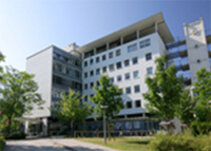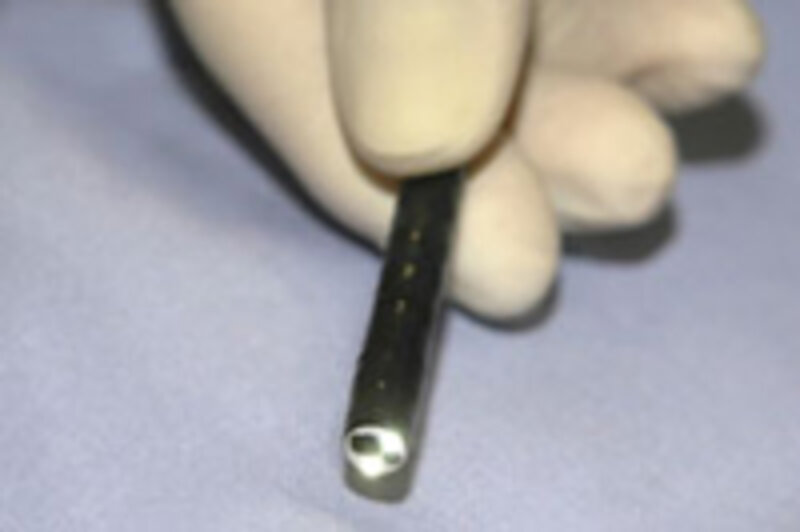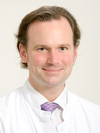Thoracic Surgery

It is our pleasure to welcome you to the Department of Thoracic Surgery at the Medical Center - University of Freiburg. Our Department is one of the largest centers for thoracic diseases in Europe. More than 3,000 operations are performed every year, primarily complex surgical thoracic interventions.
Operations for lung cancer and other thoracic malignancies including lung metastases and mesothelioma represent the main focus of our department. Our operating theaters are equipped with the newest technical facilities including the newest lung laser which allows us to perform complex operations. In addition, specialists from various fields including, pneumologists, cardiovascular surgeons, and oncologists supply interdisciplinary support. Furthermore, we work in close cooperation with our team of thoracic anesthesiology which allows us to perform complex thoracic interventions, even for patients with limited pulmonary reserve.
Our department is equipped with the newest technical support in order to achieve the exact diagnosis of all thoracic diseases including lung diseases and other respiratory problems. Among these diagnostic tools are computed tomography (CT), magnet resonance tomography (MRI), angiography, positron emission tomography (PET), ventilation- and perfusion scintigraphy, bronchoscopy including fluorescence bronchoscopy, endobronchial ultrasound examination (EBUS), endoesophageal ultrasound examination (EUS), videoassisted thoracic surgery, video mediastinoscopy, and lung function tests.
Our department has gained vast experience in the field of invasive surgical bronchiology such as stent implantations, cryobiopsy and -therapy (cold cauterization), laser treatment in case of tracheal and bronchial stenosis, esophagotracheal fistulas as well as endotracheal and endobronchial tumors.
We perform all thoracic oncological procedures, including treatment of lung cancer as well as lung metastases laser surgeries. Medical Center - University of Freiburg is currently one of the few hospitals in the world to offer patients laser surgical resection of metastases. In addition to extended resections we also perform minimal invasive procedures, such as video-assisted lobectomies and thymectomies. In cooperation with the Comprehensive Cancer Center Freiburg - CCCF we provide multidisciplinary support.

We are the only hospital in Baden-Württemberg performing lung transplantation. Another focus of our work is pediatric thoracic surgery. In our department, more than 50 children are treated per year including young patients with chest tumors and patients with chest deformities including funnel chests and chicken / pigeon breasts.
Diagnostic & Treatment Services
- Chest wall tumors
- Narrowing of the trachea
- Mediastinum / mediastinal tumors
- Pulmonary emphysema
- Lung cancer
- Lung metastases
- Benign lung tumors
- Pleural effusion
- Pleural mesothelioma
- Pneumothorax
- Pleura diseases
- Sweaty hands and armpits
- Thymoma / myasthenia
- Funnel chest
Bronchial intervention
Bronchial intervention plays an important role in the care of lung cancer patients. But it is employed not only for lung cancer but also for other indications.

Bronchoscopy
Bronchoscopy is one of the most important examination methods for diagnosing diseases of the airways and lungs.
Emphysema surgery
Emphysema surgery serves to improve respiratory mechanics as well as in the prevention and treatment of disease-related complications.
Endoscopic lung volume reduction
In some cases, lung volume reduction leads to an improvement of pulmonary emphysema symptoms. The Department of Thoracic Surgery at the Medical Center - University of Freiburg performs endoscopic lung volume reduction as an alternative to surgical procedures.
Extended interventions
In an extended intervention in thoracic surgery, anatomical structures beyond the affected portions of the lung are removed in order to achieve a safe distance in tumor operations and ensure a healthy recovery.
Laser therapy
The advantages of laser treatment of lungs are the high precision of the operation and the absence of bleeding during the surgical procedure. Such operations can reduce the risk of surgical complications and minimize damage to healthy tissue. In addition, this method allows you to remove several tumor foci at once, including neoplasms adjacent to sensitive structures. Another advantage of using a laser is to “seal” the lung tissue so that air leakage can be minimized during surgery. We use laser technology to remove metastases in the lungs and in some operations to remove malignant lung tumors. Laser surgery to remove lung metastases allows you to remove the maximum number of them while maximizing the preservation of healthy lung tissue and minimal trauma to patients.
Tracheal surgery
Tracheal operations are required in cases of tracheal leakage in benign and malignant tumors of the trachea, and may also be required for tracheal injuries such as after traffic accidents.
Lung surgery
An essential part of thoracic surgery, lung surgery includes any operations on the lung tissue.
Lung cancer, radical removal
Radical removal means that the tumor is removed with a sufficient safety margin. Thereby, an anatomically healthy layer is always removed in order to achieve a safe distance and ensure a healthy recovery.
Lung-sparing surgery
Lung-sparing surgery is the removal of tumor-bearing portions of the lung, with restoration of bronchi and vessels to preserve the healthy parts of the lung. In this technique, only the tumor-bearing lung parenchyma and those sections of the bronchi or vessels infiltrated by tumors are removed.
Lung transplantation
Lung transplantation is a treatment option for patients with advanced lung diseases such as cystic fibrosis, pulmonary fibrosis, emphysema/COPD and in rare cases, pulmonary hypertension, lymphangioleiomyomatosis or sarcoidosis.
Minimally invasive thoracic surgery/keyhole surgery
Minimally invasive thoracic surgery is also called keyhole surgery and includes surgical methods which are characterized by smaller incisions and therefore less access trauma.
Port ambulance
A port catheter represents a permanent access to the venous circulation and is used for administration of chemotherapeutic agents or other regular infusions.
Thoracic surgery in children
Children's thoracic surgery includes all thoracic surgical procedures from infants to 18 years of age. The interventions are planned in close cooperation with the Department of General Pediatrics.
Video-assisted thoracoscopic (VATS) lobectomy
In video-assisted thorascopic lobectomy, the disease-carrying portion of the lung is removed via three small body orifices.
Thoracoscopy
This is a visual examination of the surface of the lungs and pleural cavity using a special instrument (thoracoscope). This optical device with a diameter of 5 to 10 mm is inserted through a small skin incision in the intercostal space into the pleural cavity. The procedure is performed under full anesthesia. To ensure the best view, the anesthesiologist achieves collapse of the lung on the side of the intervention and more room for surgical manipulations is formed in the chest cavity. Ventilation of the lungs of an anesthetized patient occurs through the other lobe. Thoracoscopy is often used for diagnostic purposes, such as taking tissue samples from the lungs, lymph nodes, or pleura for microscopic examination. As part of such an intervention, therapeutic manipulations can also be carried out (for example, removal or healing of pathologically altered areas, pumping out effusion or gluing the pleural sheets). Such methods are referred to as minimally invasive surgery and are also called keyhole surgery. After the examination, a chest tube is inserted into the site of the thoracoscope in order to remove the air trapped during the examination, as a result of which the lung expands. Typically, drainage is left in place for several days. A tampon and a bandage are applied to the puncture site. In conclusion, control x-rays of the lungs are taken.




